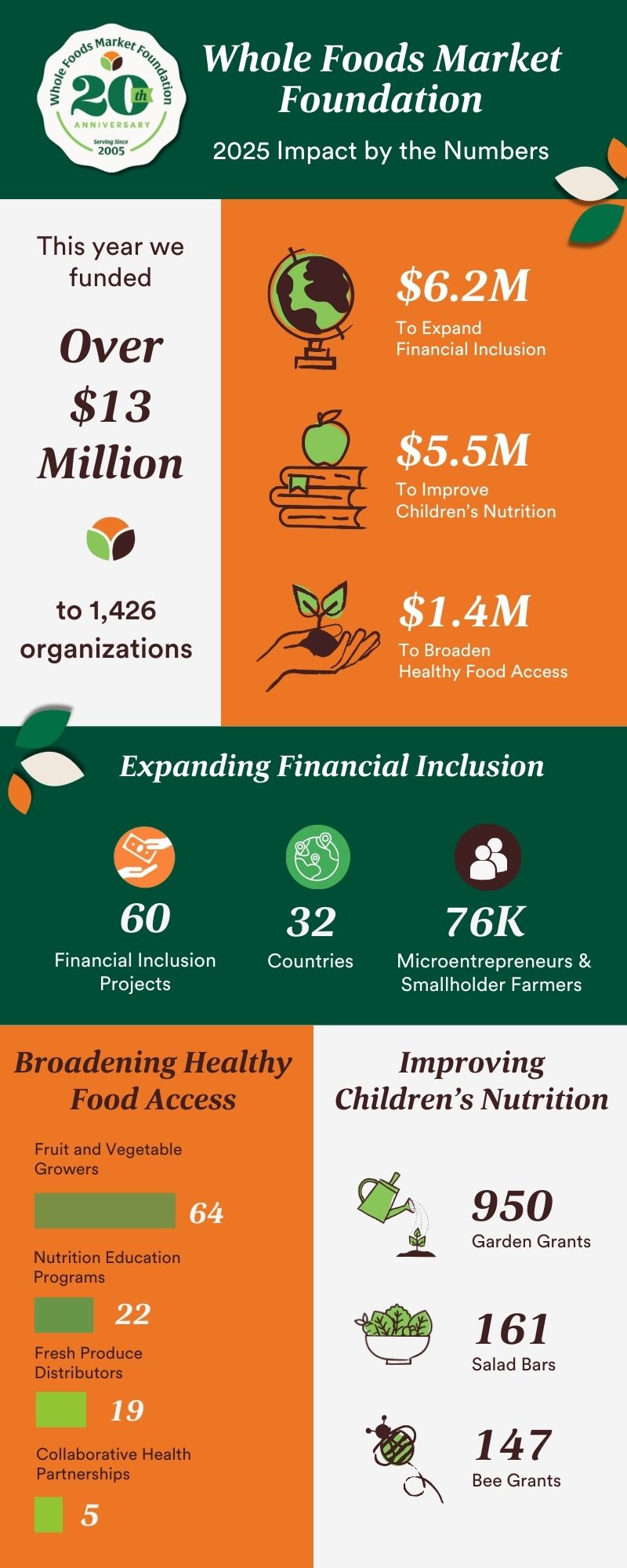
AUSTIN, Texas, February 12, 2026 /3BL/ – “At Whole Foods Market Foundation, we know that collective impact requires partnerships and collaboration. Our community partners bring deep local knowledge and innovative solutions. Whole Foods Market Team Members contribute their passion and generosity. Like-minded brands amplify our reach. Together, we’re building pathways to health and prosperity that help our local and global communities thrive. This is the power of collective action in service of a shared mission: to nourish people by advancing food security, improving nutrition, and strengthening resilient food systems.
2025 has been a year of growth and learning. Both personally as a first year Executive Director and as a team in our second year as a unified foundation, I’m energized by how our integrated approach is creating new possibilities for greater impact. Integrating our three focus areas has allowed us to think more holistically about the challenges people face around food access, nutrition and financial inclusion, and the interconnected solutions that can address them.
This past year, we also marked a significant milestone: our 20th Anniversary! Over the last two decades, we’ve supported over a million smallholder farmers and microentrepreneurs with economic opportunities, assisted hundreds of community organizations expand healthy fresh food access, and helped transform millions of children’s relationship with food to improve nutrition. We’ve witnessed the power of our unified approach to create deeper, more meaningful, lasting change through strategic partnerships. This was a wonderful opportunity to celebrate our collective impact with valued supporters, reflect on our community-led approach, and envision the next 20 years.
As we move forward, community remains at the heart of our work. The team is energized by the opportunities ahead to collaborate with our stakeholders. Together, we are creating pathways for innovative approaches that help smallholder farmers prosper, advance children’s nutrition, and foster thriving community health. I am deeply proud of our team and honored to lead such a remarkable group of passionate, intelligent, caring, and driven changemakers.”
– Daniel Zoltani
Whole Foods Market Foundation Executive Director
2025 Impact
This year, Whole Foods Market Foundation invested over $13 million in 34 countries around the world, supporting 1,426 organizations and schools to help advance healthy food access, nutrition and economic opportunities.
Broadening Healthy Food Access
- 64 Fruit & Vegetable Growers
- 22 Nutrition Education Programs
- 19 Fresh Produce Distributors
- 5 Collaborative Health Partnerships
Improving Children’s Nutrition
- 950 Garden Grants
- 161 Salad Bars
- 147 Bee Grants
Expanding Financial Inclusion
- 76,216 Microentrepreneurs and Smallholder Farmers
- 60 Financial Inclusion Projects
- 32 Countries
Learn More
2025 Spotlight Stories
Acceso – Empowering Women Farmers in Post-Conflict Colombia
In rural Colombia’s post-conflict areas, women smallholder farmers possess agricultural knowledge and entrepreneurial drive but often lack access to commercial markets and startup capital needed to build sustainable businesses.
Through Whole Foods Market Foundation’s support, Acceso Colombia’s Community Training Farm (CTF) program is bridging this gap. The program trains female heads of household and unemployed youth in agronomy, agri-business and sales, connecting them with commercial buyers.
Meet Smallholder Farmers
Chef Ann Salad Bars- Transforming School Food in Cleveland
Every day in Cleveland, Ohio, 100% of the district’s 36,298 students walk into school cafeterias eligible for free or reduced lunch. The Cleveland Metropolitan School District saw an opportunity to transform how these students experience healthy food at school.
Through Chef Ann Foundation’s Salad Bars to Schools program, the district received 46 salad bars last year. Staff expanded their culinary skills through training in food safety, knife skills, and produce preparation. The district now operates 16 hydroponic growing towers producing fresh lettuce, peppers, cucumbers, tomatoes, and herbs for school salad bars. They’ve partnered with local farms, bringing farmers who reflect the student population into cafeterias as role models.
See Scratch Cooking in Action
Restorative Farms- Growing a Better Dallas
In South Dallas, where fresh produce is often out of reach, Freddie, a Whole Foods Market Team Member, has championed Restorative Farms through five consecutive years of Community First Grant funding. Since 2021, Freddie’s advocacy has helped secure over $45,000, enabling the organization to expand their urban farming initiatives. Most recently, Freddie’s support is helping launch a new vermiculture project at Lawnview Station, a DART hub in South Dallas. With Freddie’s support, Restorative Farms is empowering individuals while building a healthier, more resilient community.
See how Restorative Farms is Growing a Better Dallas
Donor Impact that Goes Further
Whole Foods Market Foundation is deeply grateful to all donors—individuals, customers, Team Members, corporate, and supplier donors—whose generosity makes its work possible. Their contribution translates directly into community impact because Whole Foods Market covers 100% of its operational costs. Every dollar donated reaches the organizations and communities working on the front lines of food access, nutrition education and economic empowerment. Each contribution strengthens the work of partners building healthier, more resilient communities.
Whole Foods Market Foundation can expand its impact thanks to the generous support of donors, including the following 2025 top donors:
- Amazon Fresh
- Blackhawk Network
- MaryRuth’s Organics
- The Matt O’Hayer Foundation
- Nature’s Path Organic Foods
- Newman’s Own Foundation
- Ocean’s Halo
- Shoes For Crews
Meet Foundation Donors
####
ABOUT WHOLE FOODS MARKET FOUNDATION
Whole Foods Market Foundation is on a mission to nourish people by advancing food security, improving nutrition and strengthening resilient food systems. The registered 501(c)(3) non-profit organization, based in Austin, Texas, focuses on broadening healthy food access, improving children’s nutrition, and expanding financial inclusion. For more information on the Foundation’s work, visit wholefoodsmarketfoundation.org. For ongoing news and updates, follow Whole Foods Market Foundation on Facebook, Instagram, or LinkedIn.


